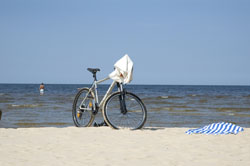Large 'bonus' for joint Baltic research
Surrounded by nine states, eight of which are in the EU, the Baltic Sea represents a formidable body of water whose drainage basin is surrounded by 85 million people. The Baltic has a much lower salinity level than other seas, boasting unique ecosystems and acting as a conduit for trade and knowledge exchange among surrounding nations. In this fertile environment, the national funding institutions and the EU fundBONUS programme which works on upgrading joint, interdisciplinary research and technical solutions among Baltic nations on science-led topics that are defined in its strategic research agenda. The BONUS strategic research agenda (SRA) thatruns up to 2017, encourages joint projects on the Baltic Sea related to environmental research, marine ecosystems, fisheries, sustainable development and policymaking. This is accomplished in line with the objectives of the HELCOM Baltic Sea Action Plan and the EU maritime policy and the Marine Strategy Framework Directive, strengthening the European Research Area (ERA) in the region significantly. Key project achievements to date include consolidating the major research funding agencies in the nine Baltic Sea countries and creating a framework for a jointly funded research programme with common rules and common use of infrastructure. The initiative also launched a joint call for projects in 2008 called BONUS+ which tested the mechanisms of collaboration among national funding institutions from 2009 until 2011 and attracted over 100 research institutes and universities. BONUS+ resulted in numerous suggestions and modifications to Baltic Sea and European policies and plans. This reinforced the joint use of research infrastructures, building important bridges of research and collaboration among the Baltic nations. Overall, BONUS has laid the groundwork for implementing calls for research and innovation projects over the next several years and facilitating collaboration among researchers and industry through conferences and workshops. BONUS has already fostered the integration of research across socioeconomic sectors and different groups of stakeholders. It has helped articulate the SRA through national and regional workshops and outlined its many themes that are continuously reviewed and updated to match the knowledge needs of the society and policy. BONUS is expected to make Baltic Sea system research more applicable to real-life solutions and inform policymaking accordingly. An evolving world and impending changes in climate will certainly put pressure on this developing research and development system to cope with challenges related to transport, agriculture, fisheries, forestry and energy. The complex issues in the Baltic Sea region will finally benefit from unparalleled cooperation among environmental, social and economic scientists and industry to create smart, sustainable and inclusive growth.



